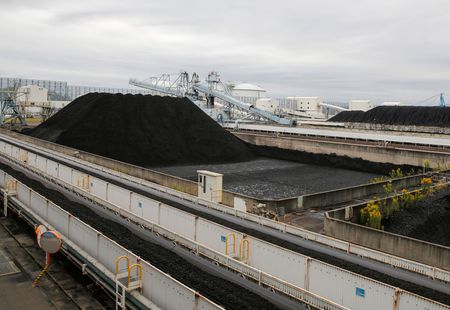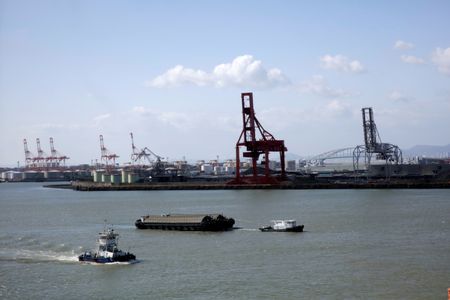By Yuka Obayashi
TOKYO (Reuters) – Japanese power utilities are stepping up efforts to cut thermal coal import costs by switching to lower quality grades and widening import sources, company officials said, as Tokyo looks to fight inflation and boost energy security.
The measures include burning more of cheaper low-to-mid-grade coal and seeking new suppliers in Africa and South America, they said, as the world’s No. 3 coal importer has sharply reduced imports from Russia, sanctioned for its invasion of Ukraine.
The disruption in Russian energy exports squeezed energy supplies globally and drove prices of coal and liquefied natural gas to record levels last year, hitting nations hard.
Seven major regional utilities have already applied to raise electricity prices from April or June as the industry takes a hit from elevated costs of imported fuels, exacerbated by the weak yen.
Prices of high-grade Newcastle thermal coal futures surged to all-time highs of more than $400 per tonne last year, tripling Japan’s import value of the fuel in 2022.
Although the prices have eased by 39% so far this year, utilities are concerned the market may rally again as top importer China recovers from COVID-19 lockdowns and will resume Australian coal imports from February.
“Among various measures to improve efficiency, cutting fuel cost is the most important thing as it’s so big,” Hokkaido Electric Power President Yutaka Fujii said last month.
Possible cost-cutting measures include using more low-grade coal, widening supplier sources and jointly purchasing coal with other companies, he added.
Japan coal imports https://fingfx.thomsonreuters.com/gfx/ce/gdvzqdwlnpw/Pasted%20image%201675305634367.png
ALTERNATIVES TO AUSTRALIA
Japanese utilities rely mostly on high-grade coal like that from Australia to maintain a heat level consistent with the installed boilers, but have been slowly increasing the use of cheaper coal since the liberalisation of the local power market in 2016 boosted competition.
Japan bought 73% of thermal coal from Australia and 7% from Russia in 2022, against 73% and 12% in 2021, the country’s trade data shows. As the price spread between Australian and European coal is wide, Japanese companies plan to increase imports from South Africa, a Tokyo-based coal trader said.
“We are looking into diversifying supply sources in areas (outside of Australia) such as Africa and South America,” Kazuhiro Ikebe, president of Kyushu Electric, said last month.
JERA, Japan’s biggest power generator, has modified some equipment at its coal power plants so that it can burn a wider variety of coal, which has already helped bring down the fuel cost by about 26 billion yen ($202 million) in the nine months ended Dec. 31, Tetsuo Yoshida, the head of finance, said.
Hokuriku Electric Power, which like other Japanese utilities posted a record net loss in the nine month period ended Dec. 31 because of soaring import costs, will continue to seek high-grade coal “as much as possible,” a company official said.
“But (we) will also use medium-grade coal in which the cost reduction benefit outweighs higher consumption volume and ash handling costs,” the official added.
REPLACING RUSSIA
Coal imports from Russia have been in sharp decline since mid-2022 and preliminary broker data suggests they have fallen close to zero for February, according to Henning Gloystein, director of energy, climate and resources at Eurasia Group.
To replace Russian coal, Japan has increased coal imports from several sources, including Indonesia, Australia, South Africa and even occasional cargoes from the Americas, including Canada, Colombia, and the United States, he said.
Japan’s biggest coal-fired power generator, Electric Power Development Co Ltd, is considering buying coal from South Africa to diversify procurement sources, a spokesperson said.
($1 = 128.4800 yen)
(Reporting by Yuka Obayashi; Additional reporting by Katya Golubkova in Riga; Editing by Florence Tan and Jamie Freed)


